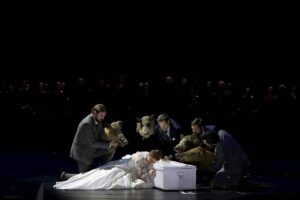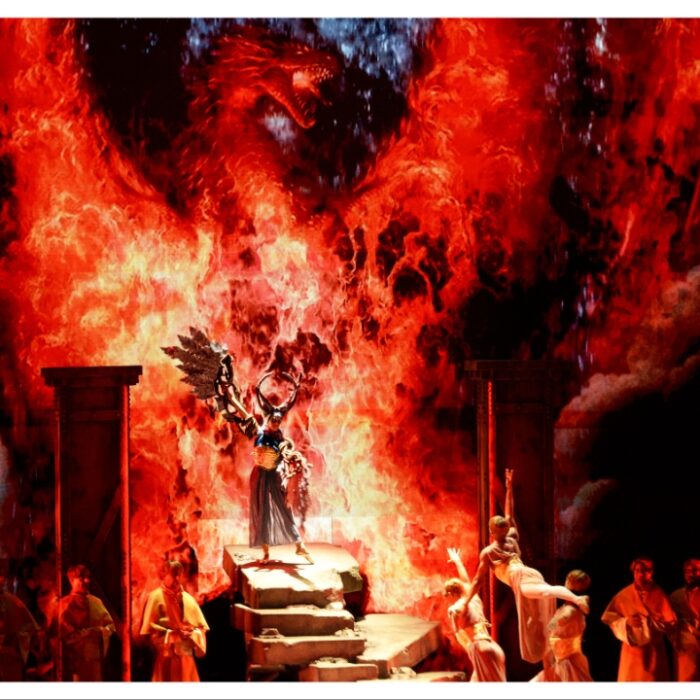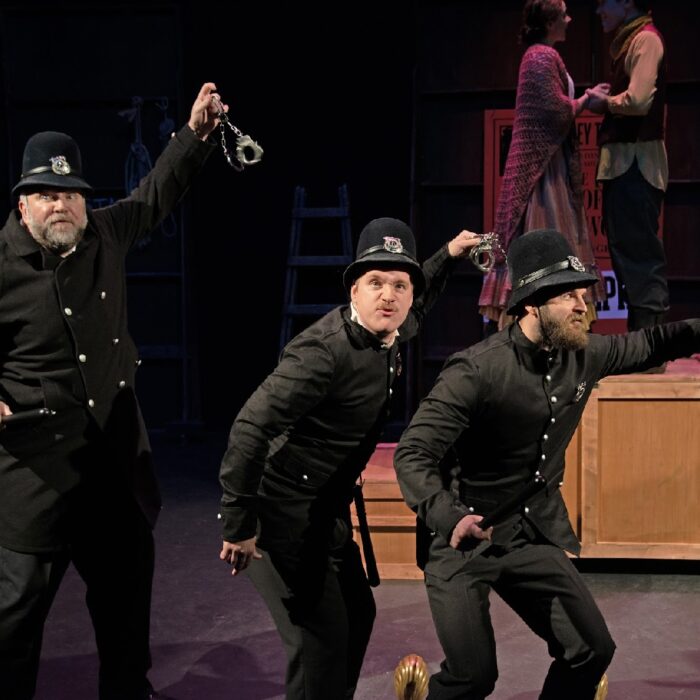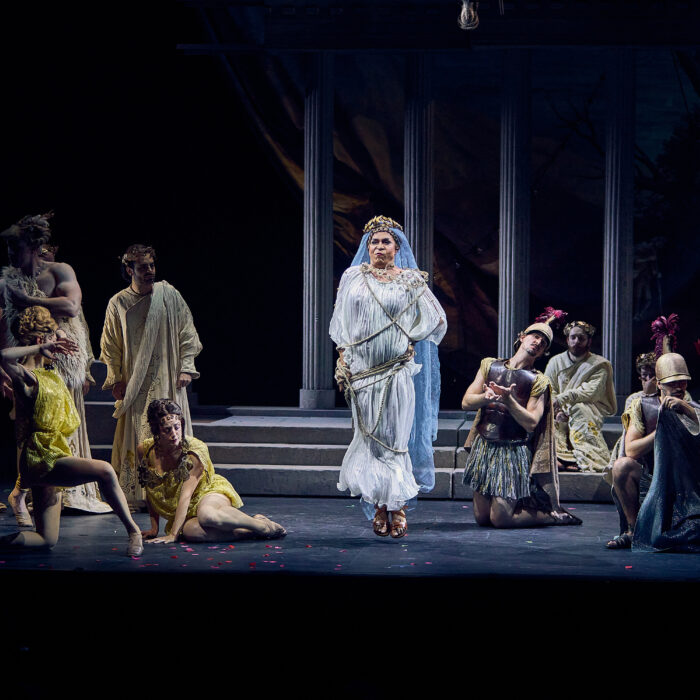
Opernhaus Zürich 2023-24 Review: I vespri siciliani
By Laura Servidei(Photo: )
Giuseppe Verdi’s “I vespri siciliani” recounts the story of a historical revolution: the uprising of the Sicilian people against their French rulers in 1282, leading to the liberation of the island from their occupation. The political narrative is intertwined with the personal lives of the main characters. Duchess Elena, whose brother was killed by the French, seeks vengeance with the help of the young hero Arrigo. In true feuilleton style, Arrigo turns out to be the long-lost son of Monforte, the French ruler of Sicily and the opera’s villain.
Calixto Bieito is Calixto Bieito
None of this was discernible on the Zurich Opernhaus stage. Director Calixto Bieito chooses a setting outside of time and space. The sets, designed by Aída-Leonor Guardia, feature a black space filled with shipping containers that open to represent various rooms and enclosed spaces. The costumes by Ingo Krüler are modern: the French occupiers, all men, wear suits, while the Sicilians are dressed in simple black outfits. None of the visuals seem connected to the plot, and the reason is clearly explained by Bieito in the program. He relies on personal images from his childhood experiences, resulting in a navel-gazing production—a solipsistic exercise that is difficult for anyone else to relate to.
The main focus seems to be violence against women. Exploiting the libretto’s reference to the rape of the Sabine women by the Romans, and the occupiers’ ensuing violence against three brides during their wedding party, Bieito fills the show with images of women being attacked, forcibly undressed, violated, dragged by ropes around their necks, carried like packages, killed, and their bleeding bodies hung from the ceiling. It was ghoulish. There is a clear line between denouncing violence against women and indulging in the display of sexually humiliated women on stage under the guise of denouncing such violence. In this production, Bieito seems to have definitely crossed that line.
Cast Highlights and Lowlights
Maria Agresta portrayed Duchess Elena with a full-bodied soprano that conveyed significant drama. While her high notes were sometimes forced, her lyrical passages were more successful. She seemed to lose steam as the evening progressed, which is understandable given the taxing nature of the role. In the famous bolero “Mercé, dilette amiche” near the end of the opera, she struggled with some of the very high notes, which she didn’t quite reach. Nevertheless, her interpretation was deeply committed and convincing. In the first two acts, she was seen dragging her brother’s coffin around the stage, with her character growing increasingly strong and determined.
Her lover Arrigo was portrayed by Sergey Romanovsky, whose strong and dark tenor verged on the “bari-tenor” range. His high notes were remarkably easy and powerful, supported by impeccable technique. It is common for tenors to sound tired and not at their best in the final act of the opera, but during the final trio with Agresta and bass Alexander Vinogradov, Romanovsky delivered some of the evening’s best high A’s and B flats on “Dunque addio, beltà fatale,” conveying all the desperation of his betrayed love.
In this production, Arrigo was depicted as a weak, insecure young man. He moved very little and didn’t interact with the other characters, except to explode in a fit of violence against Monforte when he discovered he was his father. This portrayal didn’t align well with either Romanovsky’s voice or his stage presence, which both channeled a “noble, reckless young hero,” resulting in a mixed effect not through any fault of the singer. However, the love duet between Romanovsky and Agresta in Act four, “È dolce raggio,” was one of the highlights of the evening.
Monforte, the villain of the opera and Arrigo’s secret father, was portrayed by Quinn Kelsey with a strong, well-projected baritone. However, he seemed to have some issues with vocal emission, as his voice appeared disorganized at times, with inconsistent notes and vowels, which negatively affected his legato and phrasing. Despite this, he showcased a good, elegant mezza-voce, and his interpretation was committed and believable, particularly in the villainous aspects. Monforte’s newly found fatherly love is always difficult to reconcile with such a dark character, and the production did not aid in resolving this complexity.
Giovanni da Procida, an activist, zealot, and organizer of the revolt against the French, was portrayed by Alexander Vinogradov, whose bass voice was exceptionally powerful and imposing. He was the most acclaimed singer of the evening by the Zurich audience, delivering his famous aria “O tu, Palermo” with deep emotional involvement. Although his voice occasionally lost its elegance, with the booming quality of his bass overpowering the phrasing and a tendency to sing everything in the forte range, he successfully conveyed the fanatical intensity of Procida’s political fervor.
Several “minor” characters completed the cast, portraying various officers of the French army and French aristocrats. Jonas Jud, Brent Michael Smith, Raúl Gutiérrez, Omer Kobiljak, Stanislav Vorobyov, and Maximilian Lawrie all delivered strong performances, both musically and dramatically. These characters remained on stage for most of the performance, actively participating in the action even when they were not singing.
Loud Conducting
Conductor Ivan Repušić led the Philharmonia Zurich with vigor, perhaps too much. An intimate theater like the Zurich opera house would benefit more from a nuanced, detailed interpretation of Verdi’s magnificent score. However, the musical performance was generally very loud, both in the pit and on stage. While the orchestra’s sound was beautiful and rich, with particularly remarkable brass sound, the overall interpretation did not seem particularly Verdian.
The chorus, which plays a significant role in this opera, was highly appreciated for its good taste and precise rhythm. The singers mostly stood immobile in formation on stage, contributing to the sense of alienation conveyed by this production. It was only at the end, when the revolt began, that they became animated, running to the front of the stage with loud cries of “Vendetta!” while the French officers, not the Sicilians, violently assaulted Monforte with punches and kicks. The reason for this choice, as for all the others, was not clear.



